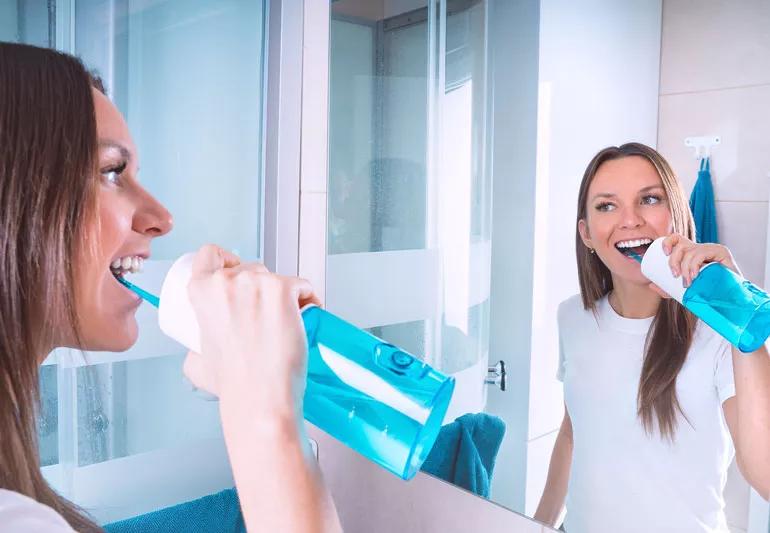This tool is an add-on to your regular brushing and flossing habits, not a replacement for them

Image content: This image is available to view online.
View image online (https://assets.clevelandclinic.org/transform/1d921f4e-4f3e-410d-a6d7-bd6dcf650b84/dental-water-pick-flosser-1359671708-770x533-1_jpg)
Person using water dental flosser in bathroom.
You know what’s a frustrating feeling? Having something stuck between your teeth. You chomp into that apple or take a bit of that salad and you can just feel it wedging itself between your teeth. Ugh.
Advertisement
Cleveland Clinic is a non-profit academic medical center. Advertising on our site helps support our mission. We do not endorse non-Cleveland Clinic products or services. Policy
But what about all the stuff that gets stuck in your teeth that you can’t feel or see? If it’s not cleared away when you brush and floss, it hardens into dental plaque, a sticky film that can lead to all kinds of oral health concerns.
Your dental health plays a huge role in your overall health, and it can even impact your mental health. So, needless to say, it’s pretty important that keep your mouth clean. And a water flosser can be a great way to boost your oral hygiene habits — but it’s important to know what they can and can’t do.
Periodontist Sasha Ross, DMD, MS, explains why you might want to invest in a water flosser, how to use it and why you’ll still need to keep using traditional floss.
Water flossers, sometimes known as oral irrigators or dental water jets, are handheld tools that shoot a stream of water at your teeth and gums. This removes extra plaque and food particles that brushing and flossing have missed.
“A lot of times, when you use a water flosser, you’ll see chunks of food coming out, even after you’ve brushed and flossed,” Dr. Ross says.
Record scratch, back it up! That’s the wrong question to ask. “Water flossers aren’t a substitute for string floss,” Dr. Ross states, “but they can be used in addition to it.”
Advertisement
That means that if you choose to use a water flosser, it shouldn’t be a replacement for traditional floss. Why? Because flossing with string can reach all surfaces of your teeth, including between the teeth and below your gum line, where water flossers can’t always get to.
The American Dental Association (ADA) recommends flossing with string at least once a day to help remove plaque and prevent gum disease and tooth decay. But you can think of a water flosser as a bonus for your mouth.
“The people who can benefit most from adding a water flosser to their routine are those who have dental implants, bridges in their teeth or a lot of gaps between their teeth,” Dr. Ross notes.
Adding a water flosser to your daily brushing and flossing habits can help keep things extra clean. “I’ve seen huge improvements in patients’ periodontal health after they start using water flossers,” Dr. Ross says.
She explains what these handy tools can do for your oral health:
Using a water flosser is pretty easy, once you get the hang of it — but it can feel a little weird at first, and all that water can get a little messy. Dr. Ross explains:
It’s important to follow the manufacturer’s instructions for using a water flosser, as incorrect use can cause gum irritation. And it’s also always a good idea to talk to a dental professional before you use a water flosser, especially if you have any dental health concerns.
If your gums bleed when you floss, that’s actually a sign that you need to floss more often. “If you’ve never done it before or don’t do it often, that bleeding is because your gums are inflamed,” Dr. Ross says.
Advertisement
Bleeding is a sign of early periodontal disease, which is reversible with treatment — if you catch it in its early stages. See your dentist for a professional cleaning and to ask how you can best care for your mouth in order to heal your teeth and gums and keep periodontal disease from progressing.
To learn more on this topic from Dr. Ross, listen to the Health Essentials Podcast episode, “Keeping Your Mouth Healthy.” New episodes of the Health Essentials Podcast publish every Wednesday.
Advertisement

Sign up for our Health Essentials emails for expert guidance on nutrition, fitness, sleep, skin care and more.
Learn more about our editorial process.
Advertisement
You might have a sensitive gag reflex — but gagging while brushing can also be a result of certain medical conditions
An old, worn toothbrush is a hazard to your teeth and gums and a breeding ground for germs and bacteria — replace it every three to four months at least
Done correctly, daily flossing can help keep your teeth and gums healthy
Bloody gums after flossing usually signal a buildup of plaque, tartar and bacteria
A variety of products can be effective at removing stains on teeth
Despite unfounded theories, fluoride has the power to make your teeth stronger
Studies show they do a better job than manual brushes at removing plaque and debris
Brushing for two minutes, twice a day is your baseline for dental health
Although it could be used as a moisturizer, this new trend is not recommended
Communicating clear limits helps protect your time, energy and emotional well-being
High cholesterol can be genetic, but testing and treatment can lower your heart disease risk